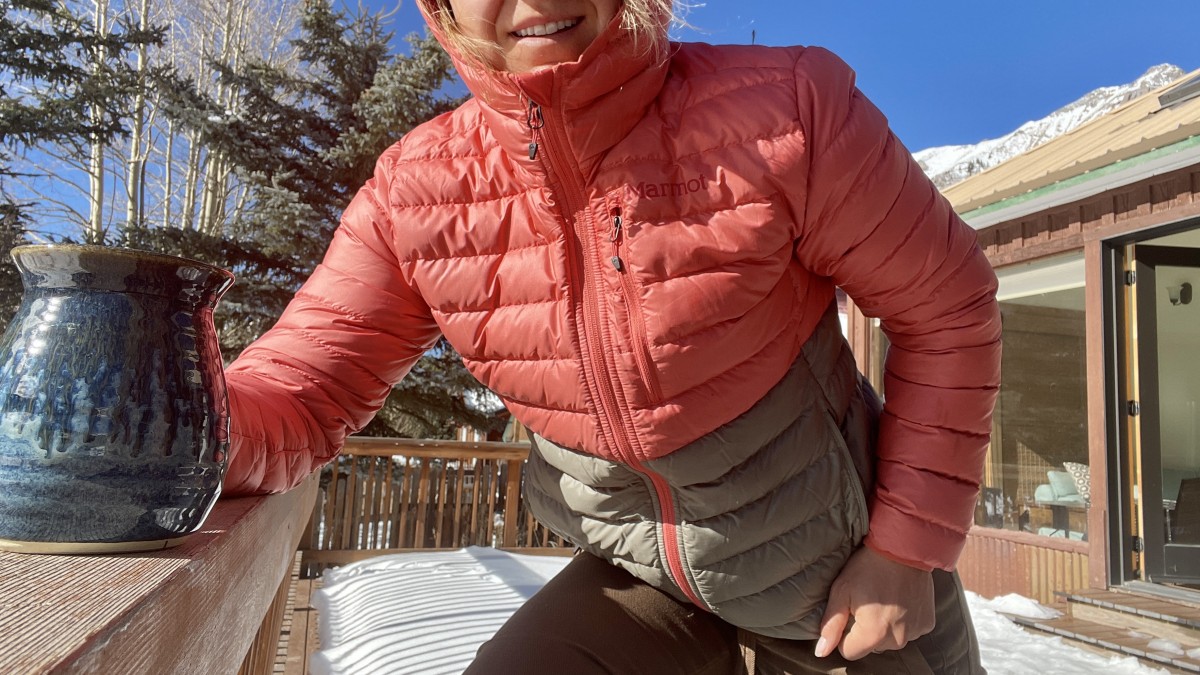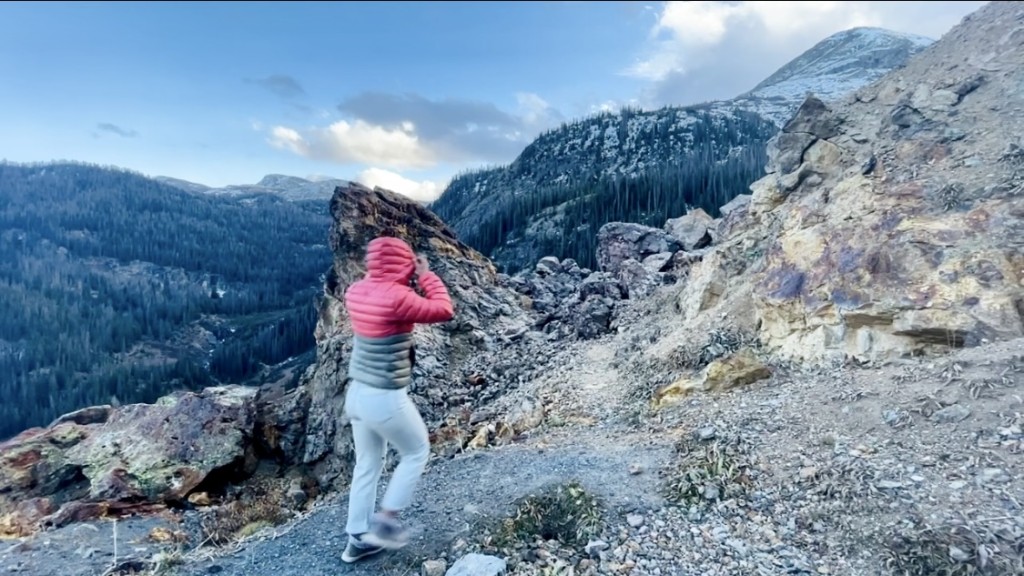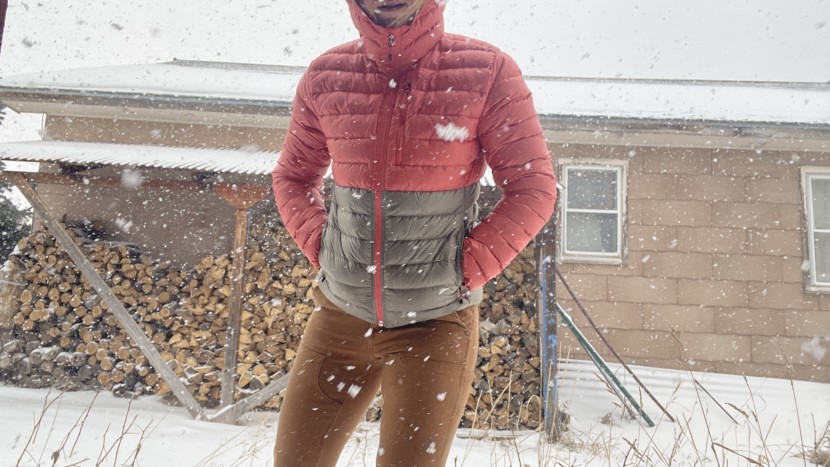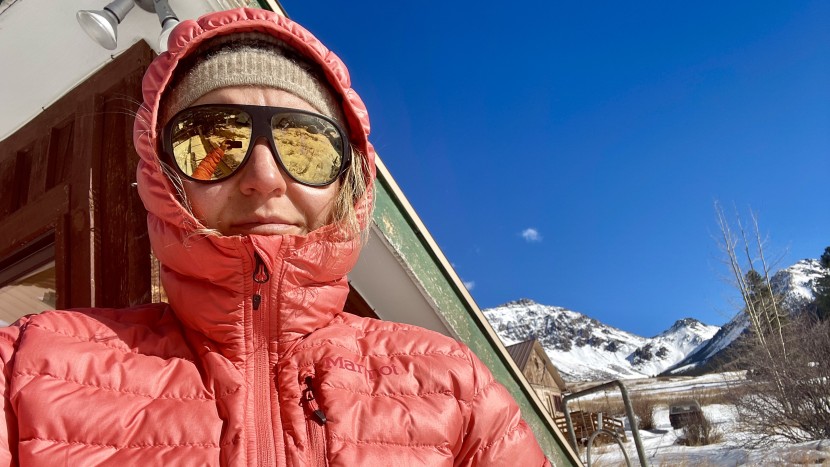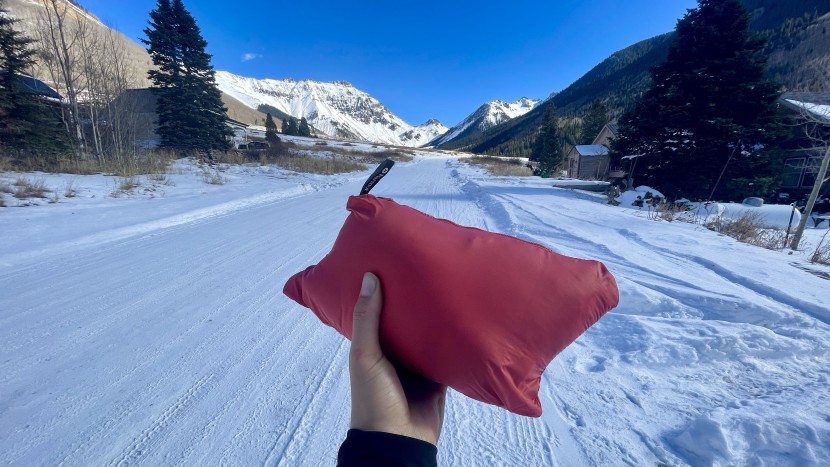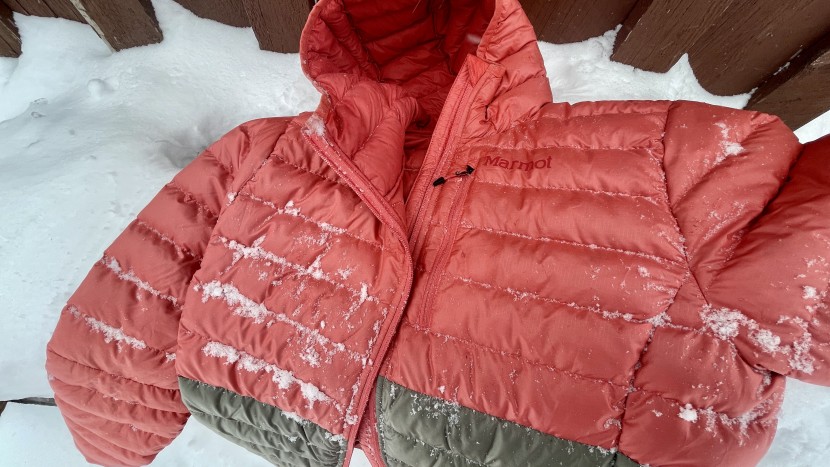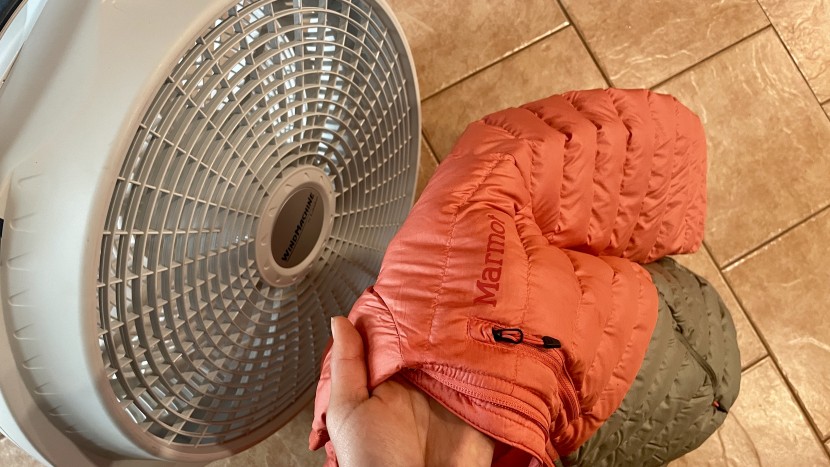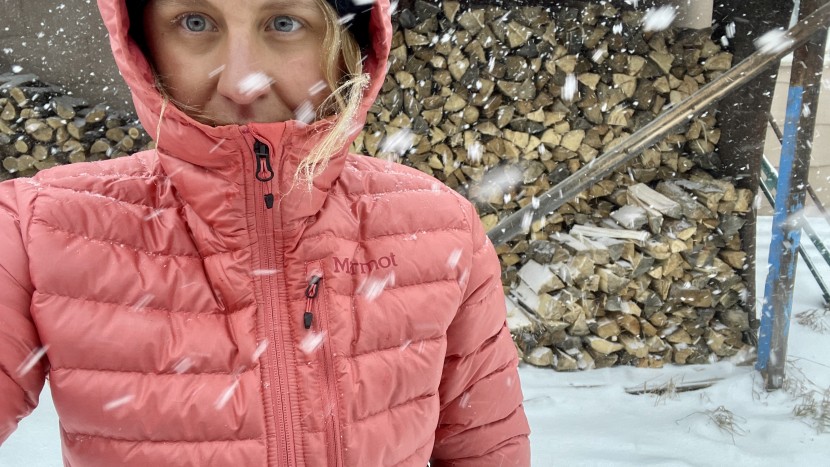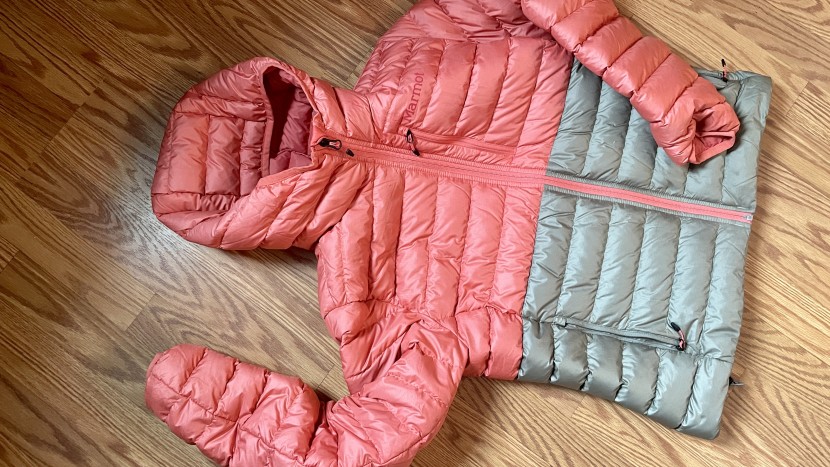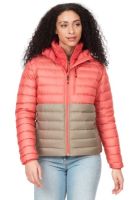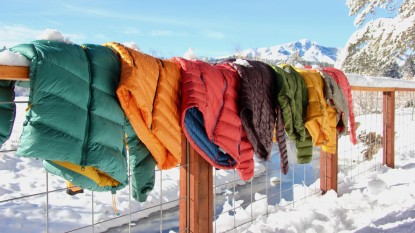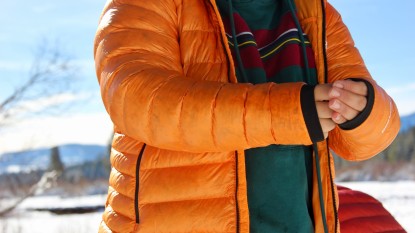
Our Verdict
Our Analysis and Test Results
The Marmot Highlander strikes a nice chord between fashion and functionality, and is a good generalist down jacket for most climates and most body shapes. It has a generous, if slightly boxy fit and appealing, fun colors that help make your down jacket less boring. It's moderately stuffed with 700-fill power down, with a nylon and ripstop blend exterior that's supple, but not fragile. It has a straight-cut hem that's slightly longer than hip length and conveniently packs into a streamlined package in its own chest pocket, weighing in at 13 ounces.
Warmth
While the Marmot Highlander didn't receive top marks for warmth, it provides enough insulation for most situations unless you're heading out in extreme cold. The 700-fill power down is on the lower end of average for jackets we tested, and it is a slimmer jacket than other mid-weight models in the lineup. There's some stiff competition in the warmth department, and while it's sufficient for most conditions, supreme warmth isn't necessarily the strong suit of the Highlander.
The hood, while not adjustable, has adequate coverage both with and without a hat or climbing helmet, but we'd love it if you could cinch it down to really batten down the hatches when it gets blustery. The high chin guard protects your face well, though we wish it had the added warmth and comfort of a fleece backer. The lack of a drop hem makes for less coverage compared to other jackets, but the single hem bungee does its job and keeps the bottom of the jacket in place. The elastic cuffs are comfortably snug and stay in place nicely to block the cold, even without adjustability.
Comfort
The Highlander is an easy-going jacket all around, and the fit reflects that. It's a no fuss, casual fit that also allows for good mobility for activity without restriction. With its low profile, it would make a great midlayer under a shell or ski jacket. While it isn't constructed with any movement-specific features, it doesn't bunch or pull when we move dynamically. It has an almost silky, not plasticky feel, is comfortable against bare skin, and slides easily over thick sweaters and fleeces. The soft and malleable exterior makes it a pleasure to wear.
The slightly square, yet slightly hourglass fit will work for a wide range of body types. However, the fit is a bit relaxed, and those who are slim might have more extra space around the bottom hem than they'd like. We love that this jacket can be a bit of a shapeshifter: the higher hand pockets are still accessible with a pack or harness, the chest pocket can help stow extra snacks and essentials and the hood fits well over a helmet. But even with a handful of thoughtful technical features, you could easily wear this jacket to the coffee shop or the office without looking like you're about to head out on a mountaineering mission.
Portability
While the Highlander is not the lightest jacket on the list, it compresses quite well and packs conveniently into its chest pocket. This adds an extra touch of convenience. With other jackets that pack into a hand pocket, we always have to take a moment to remember exactly which pocket it goes into, and the Highlander takes the guesswork out of packing. When stowed, it's a streamlined package with a dual-sided zipper with a loop that could clip to a pack or harness if you wished. We didn't have to struggle to get it into its pocket, but there's also no space wasted when it's compressed.
At 13 ounces, the weight of the Highlander is more than we'd like for the warmth it provides. There are other options that provide a much greater warmth-to-weight ratio, and when counting every ounce on a big expedition, this isn't the jacket we'd choose. But, for frontcountry adventures, travel, day trips, and shorter, less demanding outings, the Highlander is still a good, packable jacket. It doesn't feel heavy to wear either.
Weather Resistance
Lack of water resistance in the exterior fabric is perhaps the greatest weakness of the Marmot Highlander. In water tests and wet storms, precipitation began to soak into the outer fabric fairly quickly, especially in areas that rub, like beneath pack straps. Marmot doesn't claim the jacket to be wind or waterproof, so there are no illusions there. There are certainly better options if you're looking for true weather resistance in your down jacket. Ultimately though, being waterproof is not necessarily a down jacket's primary intent.
As far as wind resistance goes, we felt a bit getting in through the stitching between baffles in exceptionally frigid high winds. As previously mentioned, we wished that the hood was adjustable to help block out gusts on stormy days. Otherwise, its performance is acceptable for blocking out the weather, but not exceptional.
As long as the precipitation stays dry, the Highlander will sufficiently keep you cozy through moderate winter storms. While the exterior isn't DWR-coated, the interior down itself is treated with Down Defender, which claims to improve the resiliency of the down, speed up drying time, and make it more resistant to perspiration and precipitation. This wins the Highlander back a few points in the weather resistance metric.
Breathability
Partially due to its thinner nature, and partially to its somewhat porous exterior fabric, the Highlander breathes quite well to keep on during medium output activities, and high output if it's really cold. The shorter hem and relaxed fit allow for good airflow. When hiking, ski touring or skate skiing in cold temperatures on early mornings, the Highlander did the trick for keeping us warm, but not too hot, while moving.
While we weren't exactly enthused when the Highlander let cold gusts sneak through the seams, the opposite was true when we heated up while hiking or skiing. The lighter weight construction and softer exterior fabric don't trap as much warmth as other jackets, allowing it to be more permeable when you need body heat to escape. In fan tests, we could feel a bit of extra permeability along the arm seam, allowing for a bit of underarm temperature regulation.
Should You Buy the Marmot Highlander?
If you're looking for a highly technical, waterproof, or ultra-warm jacket--there are better options out there than the Highlander. It's not a particularly specialized jacket, but rather a generalized down layer for everyday, casual use that can perform on occasional adventures. For most people, especially those looking for a solid around-town, dog-walking, daily-driver down jacket, the Highlander is a good pick. Considering the price tag, it stacks up fairly well to competitors that will cost you nearly twice as much if you don't need all of the fancy features, extra-lofty fill, and increased water and wind resistance.
What Other Down Jackets Should You Consider?
If you're looking for versatile warmth and solid weather protection while still being style-conscious, we continue to love the Arc'teryx Cerium year after year. For top-notch active insulation while shaving a couple of ounces, the Mammut Broad Peak IN Hooded is another go-to, with similar warmth but better weather protection than the Highlander. If you're looking for a truly cozy around-town jacket, we'd highly suggest the Feathered Friends Eos; the 900+ fill down and added heat retention are worth the extra bucks if you're living in a very cold climate.
| Awards | |
|---|---|
| Price | $250 List Check Backcountry (on sale!) |
Overall Score  |
|
| Star Rating | |
| Bottom Line | A stylish mid-weight option that has the versatility to go from nordic skiing to drinks on the town for an attainable price |
| Pros | Fun colors, packs well into the chest pocket, less expensive than others |
| Cons | Slightly boxy fit, lacking adjustment in a couple of key spots, poor water resistance |
| Rating Categories | Marmot Highlander Hoody |
| Warmth (30%) | |
| Comfort (30%) | |
| Portability (15%) | |
| Weather Resistance (15%) | |
| Breathability (10%) | |
| Specifications | Marmot Highlander Hoody |
| Down Fill | 700-fill-power down, treated with 'Down Defender', 85% down |
| Responsible Down Standard (RDS) Certified | Yes |
| Outer Fabric | 100% recycled polyester and ripstop |
| Measured Weight | 13.9 oz (size L) |
| Hem Type | Straight hem; hip length |
| Fit | Standard |
| Pockets | 2 zippered hand pockets, 1 exterior zippered chest pocket |
| Hood | Yes (hoodless option available) |
| Cuff Construction | Elastic |
| Adjustment Points | Single hem bungee |
| Stow Option | Packs into chest pocket with an integrated carabiner loop |
| Features | N/A |
| Sizes available | XS - XL |
| Size XL Measured Weight | N/A |


